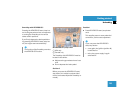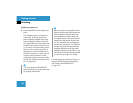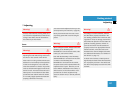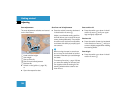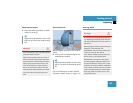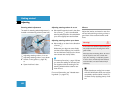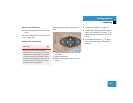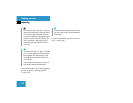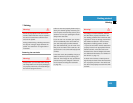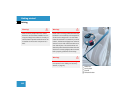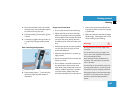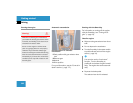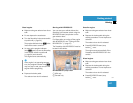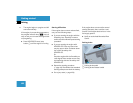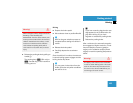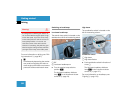
43
Getting started
Driving
̄ Driving
Fastening the seat belts
Warning! G
Do not lay any objects in the driver’s foot-
well. Be careful that floor mats or carpets in
the driver’s footwell have sufficient clear-
ance for the pedals.
During sudden driving or braking maneuvers
the objects could get caught between the
pedals. You could then no longer brake or
accelerate.
Warning! G
Always fasten your seat belt before driving
off. Always make sure all of your passengers
are properly restrained, even those sitting in
the rear and pregnant women.
Failure to wear and properly fasten and po-
sition your seat belt greatly increases your
risk of injuries and their likely severity in an
accident. You and your passengers should
always wear seat belts.
If you are ever in an accident, your injuries
can be considerably more severe without
your seat belt properly buckled. Without
your seat belt buckled, you are much more
likely to hit the interior of the vehicle or be
ejected from it. You can be seriously injured
or killed.
In the same crash, the possibility of injury or
death is lessened if you are wearing your
seat belt. The air bags can only provide the
protection they were designed to afford if
the occupants are using their seat belts
(
୴ page 67).
Warning! G
According to accident statistics, children
are safer when properly restrained in the
rear seating positions than in the front seat-
ing position. Thus, we strongly recommend
that children be placed in the rear seats.
Regardless of seating position, children
12 years old and under must be seated and
properly secured in an appropriate infant or
toddler restraint, or booster seat recom-
mended for the size and weight of the child.
For additional information, see “Children in
the vehicle” (
୴ page 71).
A child’s risk of serious or fatal injuries is
significantly increased if the child restraints
are not properly secured in the vehicle and
the child is not properly secured in the child
restraint.



